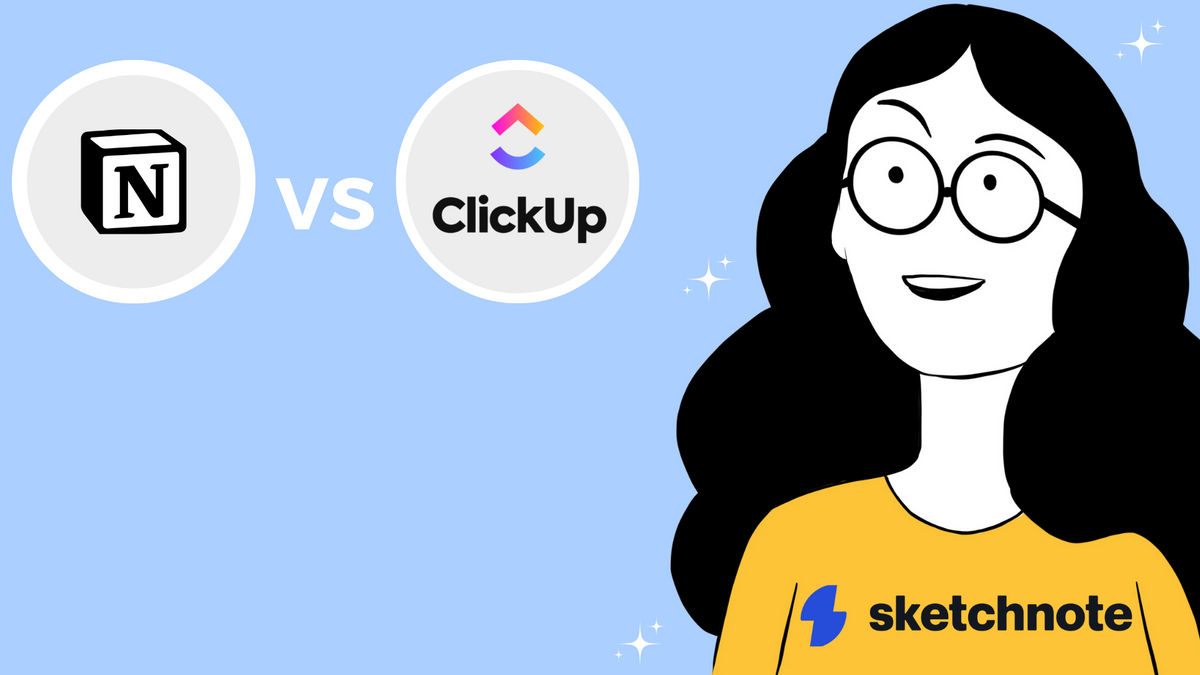When it comes to project management, there are different styles organizations work with. And some of the most pressing factors that teams need to take into consideration include flexibility and control.
For ClickUp and Notion—both veterans in the field of project management—there's plenty of both to go around.
The platforms are versatile and a commonly popular choice for productivity and project management. However, like most tools in this area, it all boils down to how well you're able to use the building blocks offered by both ClickUp and Notion to build a structure that works for every department in your company.
So, let's take a deep dive into ClickUp and Sketchnote's building blocks, and pit them against each other to see which one comes out on top.
Let's talk about ClickUp
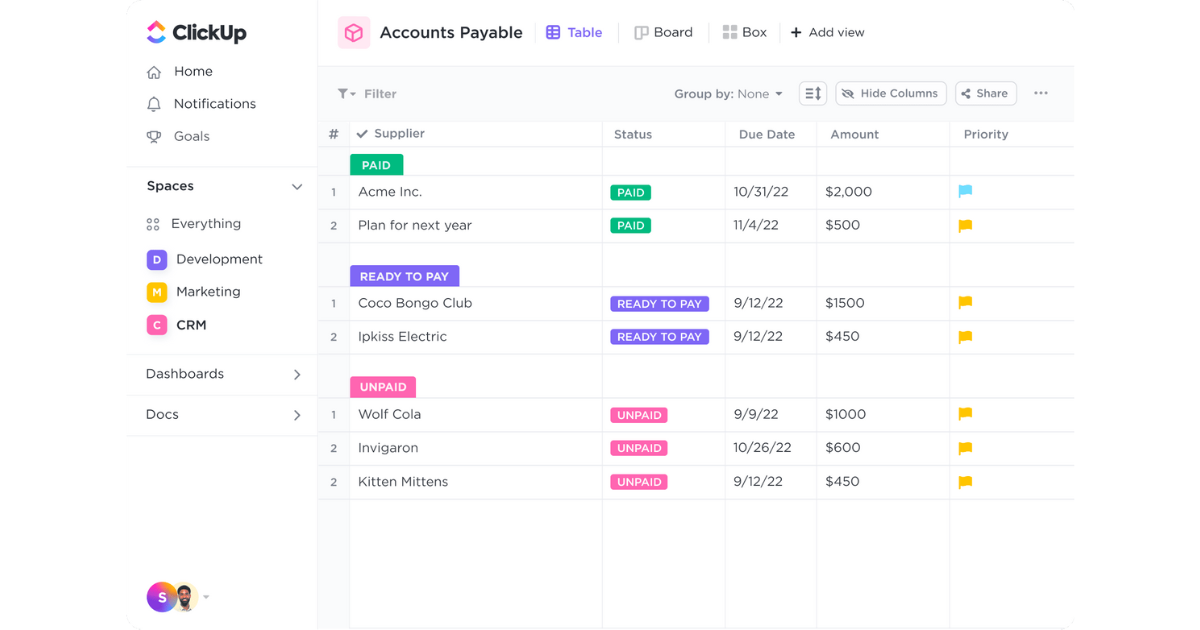
ClickUp is a productivity platform designed specifically for task and project management. The app boasts multiple tools to help teams stay organized and collaborate easily.
The app focuses mainly on Kanban boards, Gantt charts, and calendars to help set due dates for tasks, track their progress and manage dependencies.
ClickUp is popularly known for allowing users to design their own automations and customize workflows, making it a popular choice with mid to large teams.
What is Notion?
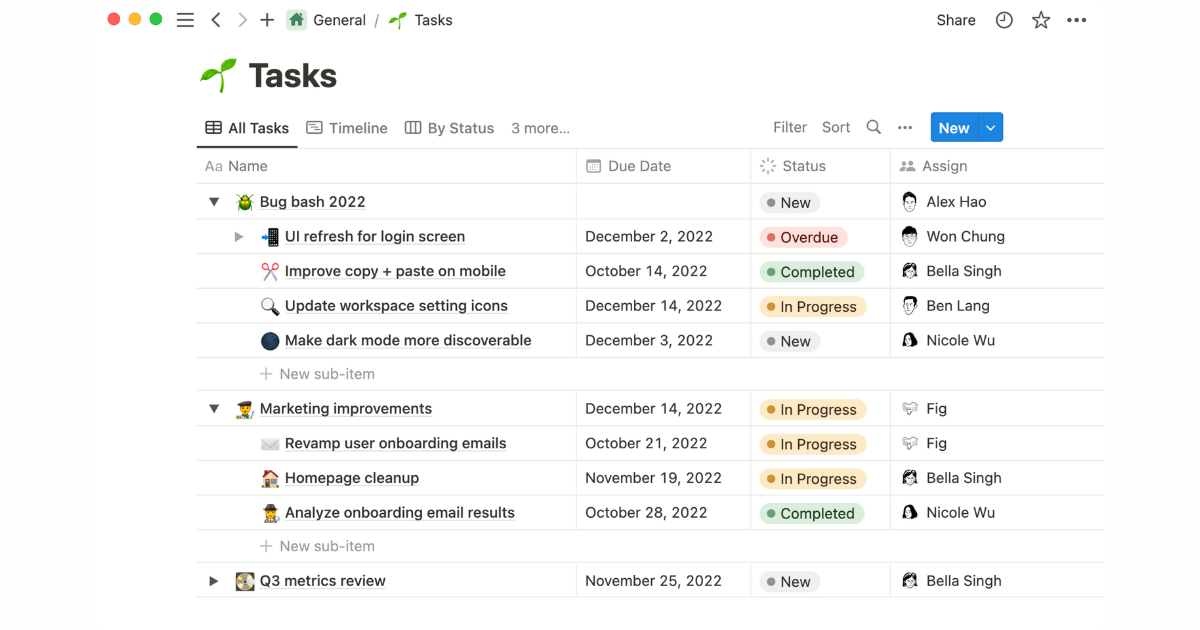
Notion is a project management app that also doubles up as a robust note-taking platform. The platform works mainly on the idea of workspaces and is ingrained in flexibility. Users can start off with templates or blank pages, designing their way through wikis, databases and more.
Notion has a block-based system that allows users to restructure and add data independent of previously added content. Mainly used to organize information and create visual documentation, Notion's real-time collaboration and public sharing links are its USP, making it a popular choice amongst individuals and smaller teams.
Major differences
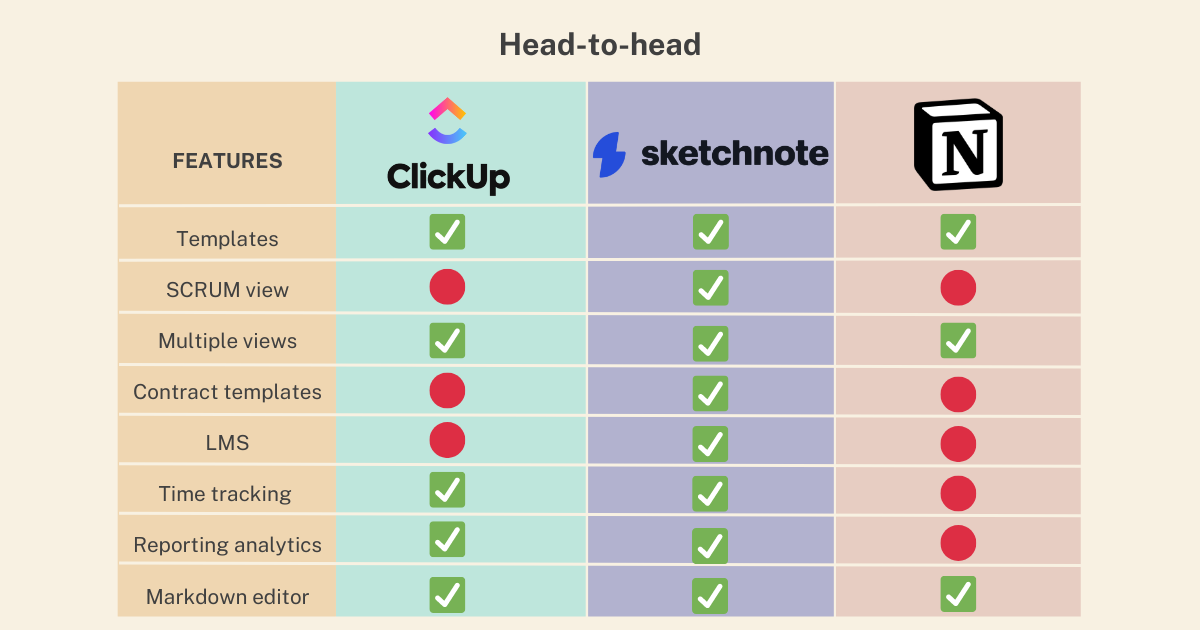
ClickUp vs Notion: Head-to-head
Documentation and wikis
Let's face it. No matter how much you say you're going to use your project management tool for just managing your tasks, you require note-taking capabilities for your organization. Whether it's simply to take down meeting notes or to build intricate wikis for your company and team's mechanisms, at least a basic amount of documentation is necessary here.
Let's see how ClickUp and Notion stack up against one another in round #1.
ClickUp
Primarily a task-based platform, ClickUp's documents seem basic in comparison to Notion's. You can critically capture all your data and notes on its markdown pages and even link them to particular tasks.
But for all intents and purposes, docs are a standalone function on ClickUp. And even though you can create wikis on it, they're nestled away in a separate corner of the app.
Given the vastness of ClickUp's task features, docs seem to exist on a separate plane from where the rest of the action is, with the platform unable to find a hook to explore its full potential.
Notion
Documents are the definitive feature of Notion. They're the foundation on which you build any database, wiki, or pretty much anything at all on the platform. So, obviously, Notion's pages are absolutely A-one.
Collaboration too is given utmost importance on Notion's pages. With that aspect and the document nesting feature, wiki building becomes a natural function on Notion.
Visually grand and flexible with its block system, the platform's documentation has the least amount of learning curve here.
Verdict
Notion easily out-muscles ClickUp when it comes to documents and wikis. But anyone who has used both platforms extensively can see why—Notion is built around these pages in their entirety.
Which brings us to...
Project management
At the heart of it, both Notion and ClickUp are project management apps, so this head-to-head is a mouth-watering prospect. But does ClickUp's detailing win over Notion's flexibility? Let's find out.
ClickUp
The reason why ClickUp is supremely popular in the market today is because of its project management architecture. Even as you sign up for ClickUp, the screen will guide you to make your space and set up a team on the platform.
ClickUp's team space is further broken down into folders and then tasks, making the hierarchy easy to understand. It also allows you to quickly add a new task or track time and access the calendar from anywhere on your screen.
Tasks are the central focus of ClickUp, allowing users and teams to add descriptions, subtasks, dates, priorities, attachments, and more. It also has a relationship section that you can use to indicate dependencies.
The platform also has a clean dashboard interface to help you gauge your tasks at hand and keep the focus on work.
Notion
While Notion can't be considered a project management app in the technical sense of the term, its flexibility works for it. Creating databases and workflows becomes easier through building blocks; if you're the adventurous type, you can take a blank page and build it to handle project pipelines on Notion easily. Or there are multiple templates available that can help you on your way.
However, Notion's databases aren't exactly intuitive, and advanced project management aspects like time-tracking, recurring tasks, and other workflows are missing on Notion.
The platform also does not work in team-centric hierarchies like workspaces and projects inside it—everything is basically a page. And this can make it rather tedious to use if you're solely in the market for task and team management.
Verdict
Quite like there's no surprise that Notion wins over ClickUp when it comes to documents, the latter has an edge for project management and productivity. The sheer number of options to flesh out a task gives it more than a small edge to ClickUp justifying its popularity. However, if you need the functionality of ClickUp with the flexibility of Notion's documents, there's Sketchnote that does both of them at a fraction of the cost!
Multiple views
While feature stacks often impress, having the ability to add multiple views to the same project or file relevant to the data is vital for many organizations. To be able to collate and find different styles of information—from documents to charts, graphs, and more—can be a make or break feature for many organizations.
Which one is the winner here? Notion or ClickUp? Let's see!
ClickUp
The short version: ClickUp has about 16 views you can add to any project.
ClickUp's default view, as we mentioned earlier, is the List view. However, you can add Kanban boards, calendars, lists, tables, teams, and more views to it to see your tasks more creatively. Some of the more interesting views include mindmaps, activities, and a map view to plot physical locations for tasks.
As far as pages go, ClickUp has whiteboard, docs and more that you can add to your projects. Plenty to choose from.
Notion
Since Notion's base started off—and continues to remain—pages, there's no clear-cut view-based structure here. Every new view you wish to add gets nestled into your main page as a sub-page. It's blank to start off with, and you can mold it the way you want to see it from scratch.
While you can start using a template inside one of the subpages, it doesn't have the capacity to show you your existing work in different styles or have much of a co-relation with your parent page.
Verdict
ClickUp has an upper hand here as well. The multiple views allow you to always remain on top of your work. While there's no limitation to how you can flexibly utilize this on Notion, since it's not natively a project management platform, it gets a tad complex and time-consuming to build it into one for your team.
Or you can simply use Sketchnote!
Ease of use
No project management platform seems easy to use in the first go. It's only natural to find a whole new application rather overwhelming. But when you finally get onto that learning curve, does Notion's clean interface get easier to master with time, or does ClickUp's versatility get the edge? It's round #4
ClickUp
Clean and intuitive, ClickUp's UI makes it easier on the eyes and isn't overwhelming if you're already used to working on any project management software. However, the learning curve is a bit steep at times and you will require troubleshooting or help page access to master your tasks.
Thankfully, ClickUp's customization is vast enough to allow you to build your own dashboard views. But the downside of this is that it's a) not easy for beginners, and b) large enough that you may not be able to fully grasp its power for a long time.
Notion
Visually rich and extremely clean, Notion justifies its beginnings as a note-taking app. Set an emoji for pages and find them quickly on the side menu. Any image you add to your page instantly becomes the centre piece of it, making it great for creating moodboards and more.
But the downside here is that since you begin with a blank page every single time, it's easy to feel lost and overwhelmed when you need to build larger task sheets and work on the platform as a team. Quickly turning to pre-existing or community-created template makes most sense here.
Verdict
It's a tie here. And it boils down to your personal preference. If intricate tasks aren't what you're looking for and visual aesthetics are more your thing, Notion wins out. But if you can get over the initial hump of the learning curve, ClickUp is for you.
Pricing
Project management and productivity apps for your entire team aren't exactly affordable (Or are they? Scroll to the bottom of this blog post to find out!) but Notion and ClickUp are similarly priced for their feature upgrades. However, the difference lies in the fact that Notion is targeted towards smaller teams and single users, so the features-for-price detailing becomes a little varied here. Let's give you a lowdown.
ClickUp
While ClickUp has a Free tier, it's limiting in terms of the features offered, including storage space. Smaller teams may benefit from the forever-free slab, but it's worth checking out the unlimited option for this use case.
Other tiers include Business for mid-sized teams and a Business Plus plan for multiple teams within organizations.
ClickUp also has a custom Enterprise plan option.
Notion
As we've mentioned in this blog post before, Notion's USP is its offerings for solo users. And their pricing plans are reflective of their focus. Keeping that in mind, the free personal plan is a popular option amongst its users.
However, this tier does not allow for any members to be added to your team. The Personal Pro plan allows unlimited guests, but to be able to seamlessly work with your organization, the Team plan is your best bet.
Like ClickUp, Notion too offers an Enterprise plan with multiple additional features for larger teams.
Verdict
Since this show down is all about project management, which of course is done with teams in mind, ClickUp's ability to have team members in all tiers makes it a better value for money.
With that, let's take a look at the final verdict.
ClickUp vs Notion: What platform should you go for?
Given the two vastly different styles of platforms, deciding between ClickUp and Notion boils down to your personal preference. Notion is visually rich and extremely flexible with its blocks, and makes the most sense if documentation and collaboration is your main concern.
If you're looking for a more task-based approach from your project management software, ClickUp wins despite its learning curve. It does boast robust task management and productivity capabilities and works best for bigger teams.
Sketchnote: A solid alternative to ClickUp and Notion
But what if we told you that getting the flexibility of documentation and super project management can be achieved on the same platform, at a competitive price point at that?
Check out Sketchnote, an all-in-one solution for your business. The bundled capabilities here allow you to design your own intricate workflows, track time and get detailed analytics reports, and allows you to collaborate and build your wikis with ease.
Sketchnote's workspace and file hierarchies have been designed to work seamlessly with small, medium, and large teams. And annual plans start for as low as $3 per user, per month!
Sketchnote gives you an edge over ClickUp and Notion
Want to take a deeper dive into what makes Sketchnote a better alternative to Notion and ClickUp? Let's check it out:
Separate SCRUM view
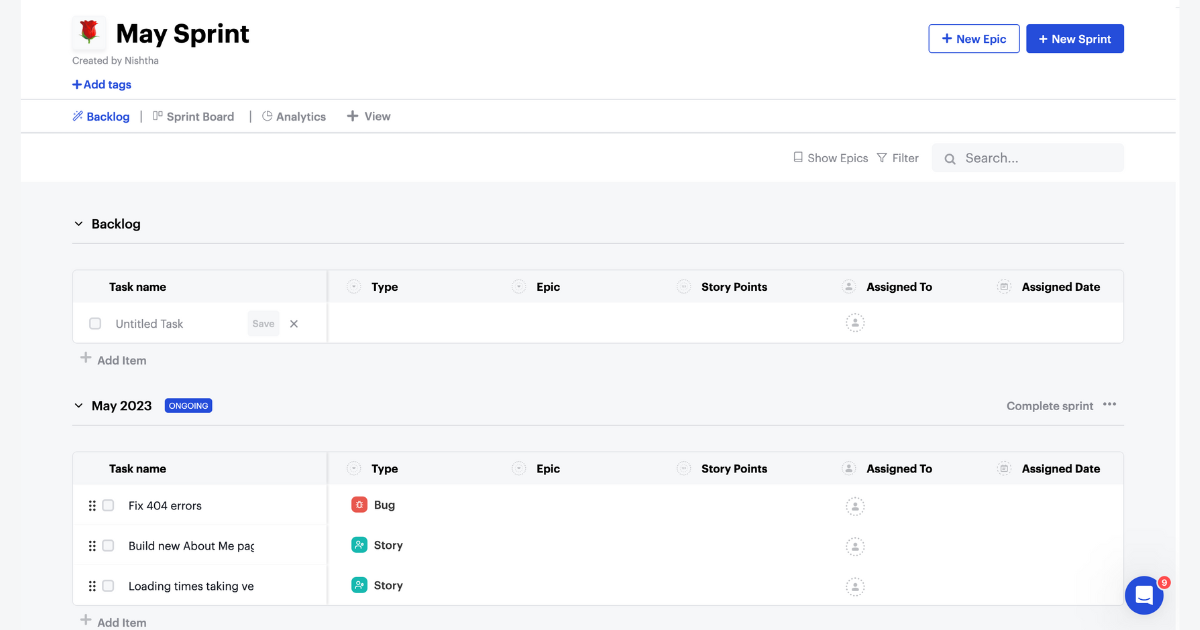
Sprints are the ethos of many, many companies today. Creating a robust SCRUM template that can be reused specifically for your needs is time-consuming and not a one-off job—it goes on and on.
While ClickUp and Notion both have SCRUM templates on offer, only Sketchnote has a separate SCRUM view. You can simply start a SCRUM sprint as a separate file, with everything in place, and visualize your finished tasks better.
Better pricing
For a competitive price point, you can get the documentation features of Notion and the task management capabilities of ClickUp—in one place! Sketchnote's Pro tier, priced at $7 a month, annually, gives you access to unlimited workspaces, over 10 views, unlimited storage, and a lot more.
Sketchnote's Advanced plan, aimed at medium to large teams, is priced at $10 a month, annually. It comes with all features in the Pro plan, plus access to detailed timesheets, unlimited guest access and custom fields, and more.
Check out what the pricing chart on Sketchnote looks like.
Contract templates

Are legal bills keeping you up at night? Any business owner will tell you how expensive creating even the most basic legal papers are. And you need those in plenty when you're dealing with vendors, freelancers, partners, and more on a daily basis.
Sketchnote's one-of-a-kind Contracts section allows you to create your own basic legal papers, within seconds! So whether it's an NDA, an MoU, a Founders' agreement or a Letter of Intent, generate one for your requirement with just a few clicks on Sketchnote. And at a fraction of the cost of keeping a legal firm on retainer.
Now here's a feature not many other project management platforms can boast of!
Easy learning curve
It can get a bit overwhelming when you first decide to embrace a project management platform. The first people in the system are usually the ones tasked with discovering and setting the standards, SOPs, and flows for the rest of the organization. And that tall task becomes even more crazy if the learning curve is sort of steep.
However, compared to ClickUp and Notion, Sketchnote has an easy learning curve. The platform guides you through each step of the way, also offering multiple help docs, case studies and online workshops to aid you on your journey
Docs+Task management in one
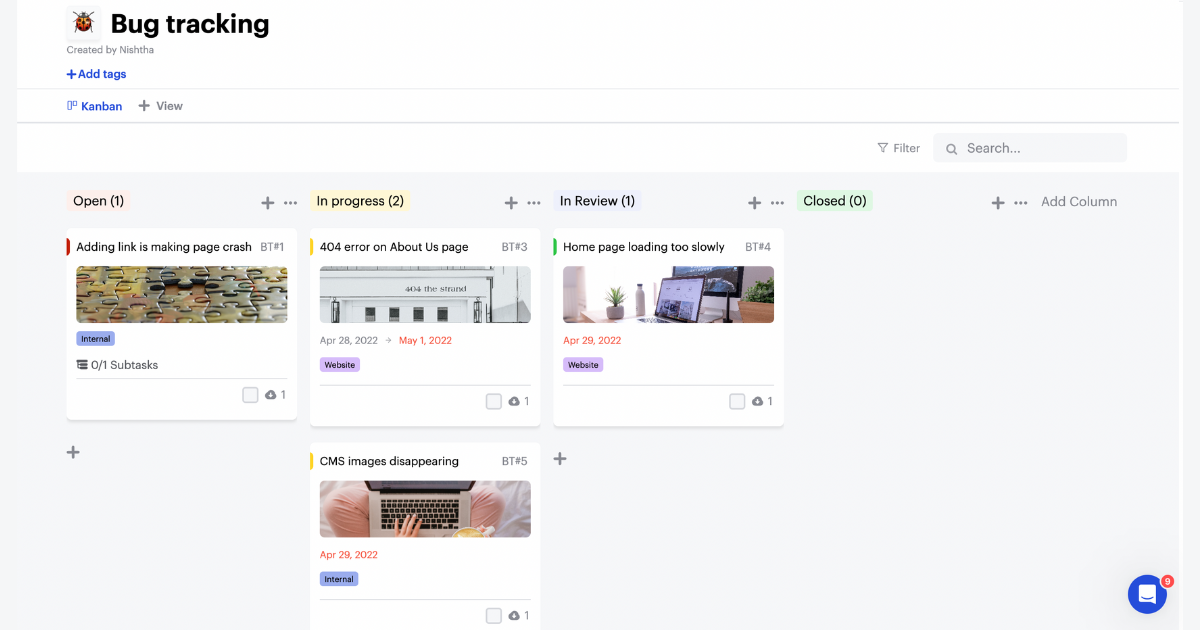
Why choose between ClickUp and Notion? While one specializes in documentation, the other is a task management app. What if you could just have both in one place?
Sketchnote marries the two with a stacked system that allows you to easily add a fully-loaded markdown editor doc within your existing file. Not only do you get project management features like time-tracking and analytics on Sketchnote, but also wiki-ready docs and an AI bot for making easy work of your writing tasks.
A robust learning management system
Sketchnote was built on the foundation of spreading an entrepreneur mindset and aiding learning within organizations. With that in mind, Sketchnote offers 100+ pre-loaded lessons on the Academy dashboard, which can help you and your team learn more about the world of business.
The courses have been designed by VCs and entrepreneurs from across the world and are broken down into easy-to-learn flash cards. Any 15-minute coffee break can turn into a learning experience with Sketchnote's lessons.
The platform has also introduced a Learning Management System (LMS) which will allow you to design your own courses for your employees. From onboarding material, to mandatory compliance courses, and even upskilling lessons, use Sketchnote's LMS system to encourage your team to push beyond their boundaries.
An impressive free tier
Sketchnote's free tier gives you access to not just documents for all your wiki needs, but also the most important task views—and unlimited tasks—so that you don't miss a single deadline.
Why use Sketchnote for your project management needs?
Now that you've seen the blow-by-blow breakdown of how Sketchnote is a smarter alternative to ClickUp and Notion, let's summarize what the powerful platform can do for you:
- Multiple views: Sketchnote has 15 views, and counting, including task views, page views, contracts, chat view, PDF chat and more.
- Unlimited tasks: Add as many tasks as you need and assign them to your team on Sketchnote
- Time tracking: Keep a tab on how long you spend on each task to get a complete overview of your work.
- Analytics: Get a bird's eye view of your team's time spent on task, easily spot and remove bottlenecks, plan your pipeline based on burn-up and burn-down, and more.
- SCRUM: Simply start a new SCRUM sprint with a couple of clicks on Sketchnote.
- Lessons and LMS: Besides 100+ pre-loaded business lessons on Sketchnote, you can design your own courses for onboarding, upskilling, and mandatory compliance training for your teams.
- Contract templates: Cut out the excessive legal costs from your company's budget with legal templates on Sketchnote like NDAs, MoUs, and more.
The last word
So there you have it! A complete versus between ClickUp and Notion. And a brief look at how Sketchnote can actually help you get the best out of your project management needs at a really competitive price.
Want to see how Sketchnote can really help your business? Sign up now to get a free two-week trial of our Advanced plan and check it out!



